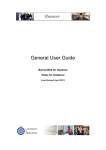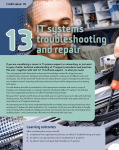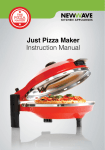Download User Guide - 5741
Transcript
UK Data Archive Study Number 5741 - Survey of Public Attitudes and Behaviours Toward the Environment, 2007 2007 Survey of Public Attitudes and Behaviours Toward the Environment The 2007 survey establishes a representative picture of what people in England think and how they behave across a range of issues relevant to the environment. These data follow from previous Environmental surveys run by Defra and its predecessors in 1986, 1989, 1993, 1996-7 and 2001. Some questions are comparable allowing time series analysis. These surveys can be accessed from the following links: • SN 4741 -Survey of Public Attitudes to Quality of Life and the Environment, 2001 • Survey of public attitudes toward the environment and quality of life, 19967 • SN 3329 Survey of Public Attitudes to the Environment, 1993 • SN 2685 Survey of Public Attitudes to the Environment, 1989 • SN 2684 Survey of Public Attitudes to the Environment, 1986 The data were collected from a representative sample of approximately 3,600 individuals in England during spring 2007. The sample was similar in size to the 2001 survey. The survey was administered on behalf of Defra by the British Market Research Bureau (BMRB) and they provided a full report to Defra which includes analysis of every question in October 2007. This can be found on the Defra website here: • http://www.defra.gov.uk/environment/statistics/pubatt/ Basic Quality Information Relevance: These results are relevant to Defra and Government policy on many areas including climate change. They provide data that will allow assessment of current levels of behaviour in different environmental subject areas, particularly transport, energy efficiency and recycling. The data also give an insight into people’s attitudes, and are being used to cluster the population into segments that will facilitate better targeting of information and publicity. Accuracy: These data were collected by the British Market Research Bureau (BMRB) on behalf of Defra. They were contracted to administer a 45 minute survey entitled “2007 survey of public attitudes and behaviours toward the environment” on a sample of 3,600. After fieldwork was complete, the exact sample size was 3,618 and the interviews took an average of 51 minutes. BMRB also administered 15 minutes of additional questions that did not fit on the main survey to a sample of 1,661 as part of an omnibus survey. Both surveys involved face-to-face, computer-assisted (CAPI) interviews of adults (16+) in England, at home using the sample design detailed below. Sampling: BMRB utilised ‘random location’ sampling. Primary sampling units (PSUs) for random location samples were selected with a probability proportionate to size, containing approximately 300 addresses. A total of 378 PSUs were selected for the survey, with 9-10 interviews achieved in each area. Research shows only minor divergence between the results from random samples and high quality quota samples such as used here. The results of the weighting analysis, (see below) show the sample taken by BMRB was representative. Weighting: BMRB’s statistical team carried out an analysis of the finished dataset to identify the best weighting variables and apply cell, rim or other form of calibration weighting as necessary. This checked whether there was need to bring the sample in line with the population profile on key variables. The weights should only be applied if they will demonstrably reduce bias (i.e. there should be a correlation between the demographic data and key survey data), and this was not applicable for these survey results – i.e. BMRB reported that there was no need to weight to correct for any disproportionate element in the sample design. Timeliness: The fieldwork was completed by June 2007. Analysis and quality assurance were completed in the intervening period between release of reports / data to ensure accuracy and accessibility of the results. Accessibility: Results and analysis are available in the statistics section of the Defra website. The data themselves are being made available via this submission to the UK data archive. Comparability and coherence: This survey has undergone a major overhaul since data were last collected in 2001 to improve and re-focus the questions to today’s policy agenda. Limited time series have are available. The survey itself can be found on the statistics section of the Defra website so that the wording of a particular question can be compared with questions used to collect similar data on other surveys. For example, the National Travel Survey administered by the Department for Transport includes questions on method / frequency of travel. Technical Information for SPSS Files The results for each question are represented by one or more variables. Each variable has a short variable name displayed on the data view tab. On the variable view tab, each variable is shown with meta data information that is required to have a full understanding of each question. This includes the “label” which shows the full question asked and the question number from the copy of the survey itself (e.g. B1, F3 etc), and the “values” which show what each code in the data table means for that variable. Standard SPSS conventions have been applied with non-response answers such as “don’t know” or “no answer” coded as minus values like “-1” or “-2”. Individual questions from the survey follow 2 formats: 1. Data for most questions is represented by a variable on a one to one basis with all possible answers allocated a different code. 2. Data for some questions are represented by several “yes/no” or “1/0” variables. For example, when asked what stops them from recycling more than they currently do, respondents could give more than one answer. Therefore, results for this question, and those like it, take the format of one variable for every possible answer. For example, on the recycling question, answers included “no doorstep collection”, and “no where to store it”, each of which is represented by its own variable. This allows a practical way for those who cited both (and others) as a reason to be most easily recorded. That is, each respondent, or data row, has a “yes/no” or “1/0” code for each possible answer relating to an overarching question. This set-up applies to both the main survey results file and the Omnibus survey results file. Defra Survey of Attitudes, Knowledge and Behaviour in relation to the Environment Final questionnaire Version 12.0 31/03/07 Section A: Section Section Section Section Section B: C: D: E: F: Section G: Household and respondent characteristics Wellbeing TGI Life Values (for Fusion) Travel behaviour Energy and water efficiency in the home Recycling, composting and reducing waste Purchasing behaviours Awareness and attitudes in relation to the environment/climate change Further household and respondent characteristics Defra Environment Survey 2007 1 of 39 A HOUSEHOLD AND RESPONDENT CHARACTERISTICS, WELLBEING Household and respondent characteristics First of all, I’d just like to ask some questions about you and your household. A1 ASK ALL SHOW CARD A1 Which of the statements on this card applies to you? Working full time Working part time On a local or government training scheme (GTS) On an Apprenticeship Registered unemployed/signing on for jobseekers allowance Not registered unemployed but seeking work At home/not seeking work Long-term sick or disabled Retired In full-time education Other (specify) Don’t know Refused A2 Including yourself, how many people usually live here? Please include all adults and children. ENTER NUMBER Defra Environment Survey 2007 2 of 39 A3 IF 2+ PEOPLE in household (INCLUDING RESPONDENT), ASK FOR EACH OTHER HOUSEHOLD MEMBER. IF RESPONDENT ONLY, GO TO A7 IF 3+ PEOPLE IN HOUSEHOLD INCLUDING RESPONDENT, QUESTION TEXT TO READ: “Please could you tell me about the other people in the household,starting with the oldest. What relationship is this person to you? So they are your… IF 2 PEOPLE IN HOUSEHOLD INCLUDING RESPONDENT QUESTION TEXT TO READ: What relationship is the other person to you? So they are your… 1. Husband/Wife 2. Partner 3. Son/daughter (incl. adopted, foster, step) 4. Son/daughter (in law) 5. Mother/father (incl. adopted, foster, step) 6. Mother/father (in law) 7. Brother/Sister (including step, foster and adopted) 8. Grandparent 9. Grandchild 10. Other relative 11. Other non relative Don’t know Refused A4 ASK OR CODE IF OBVIOUS: And are they male or female? Male Female Refused A5 And how old is he/she? ENTER AGE IN YEARS TO THE CLOSEST YEAR. IF LESS THAN 6 MONTHS OLD, ENTER 0. NUMERIC RANGE 0…99 Don’t know Refused Defra Environment Survey 2007 3 of 39 A6 IF MARRIED/LIVING WITH PARTNER. OTHERS GO TO A7 SHOW CARD A1 AGAIN Which of the statements on this card applies to your [spouse/partner] Working full time Working part time On a local or government training scheme (GTS) On an Apprenticeship Registered unemployed/signing on for jobseekers allowance Not registered unemployed but seeking work At home/not seeking work Long-term sick or disabled Retired In full-time education Other (specify) Don’t know Refused ASK ALL Next a few questions about your home and the area you live in A7 SHOW CARD A2 First of all, which of these best describes your home? Detached house Semi-detached house Terraced house Bungalow Flat (in a block of flats) Flat (in a house) Maisonette Other (specify) Don’t know Refused A8 SHOW CARD A3 In which of these ways do you occupy this accommodation? Own it outright Buying it with the help of a mortgage or loan Pay part rent and part mortgage (shared ownership) Rent it Live here rent free (inc. rent free in relative/friend's property, excluding squatting) Squatting Don’t know Defra Environment Survey 2007 4 of 39 A9 IF CODES 3-5 AT A8 Does the accommodation go with the job of anyone in the household? Yes No Don’t know A10 IF CODES 3-5 AT A8 Who is your landlord? PROMPT TO PRECODES Local authority/council/new town development A housing association, charitable trust or local housing company Employer (organisation) of a household member Another organisation Relative/friend (before you lived here) of a household member Employer (individual) of a household member Another individual private landlord Not applicable – living rent-free with parents Other (Specify) Don’t know A11 ASK ALL Do you know roughly when your home was built? PROMPT IF NECESSARY 1929 or earlier 1930-1965 1966-1994 1995 or later Don’t know Refused A12 ASK ALL And how long have you lived in your current home? Up to 1 year More than 1 year, up to 2 years More than 2 years, up to 5 years More than 5 years, up to 10 years More than 10 years, up to 20 years More than 20 years Don’t know Refused Defra Environment Survey 2007 5 of 39 A13 Do you have a garden? PROMPT IF NECESSARY Yes – own garden Yes – garden shared with others No Don’t know A14 SHOW CARD A4 Which phrase on this card best describes the area where you live? A big city The suburbs or outskirts of a big city A town or a small city A country village A farm or home in the countryside Other (specify) Don’t know Wellbeing A15 ASK ALL SHOW CARD A5 The next few questions ask about some different aspects of your life. First, all things considered, how satisfied are you with your life as a whole nowadays? Please answer using this card, where 0 means extremely dissatisfied and 10 means extremely satisfied. 0 (Extremely dissatisfied) - 10 (Extremely satisfied) Don’t know Refused Defra Environment Survey 2007 6 of 39 Wellbeing Value statements A16 SHUFFLE PACK A SHUFFLE CARDS AND HAND TO RESPONDENT WITH SORTING BOARD A Next, please could you look at these cards and place them on this board to show how much you agree or disagree with the statements on the cards. ASK RESPONDENT TO READ BACK NUMBERS IN EACH ANSWER CATEGORY, STARTING WITH ‘DEFINITELY AGREE’ 1. In general I feel very positive about myself 2. I spend a lot of time worrying about things Definitely agree Tend to agree Neither agree nor disagree Tend to disagree Definitely disagree Not applicable (NOT ON SORTING BOARD) Don’t know Defra Environment Survey 2007 7 of 39 B TRAVEL BEHAVIOUR Car use Now some questions about your use of transport B1 ASK ALL How many cars or vans are available in your household for you to use either as a driver or a passenger? NUMBER OF CARS OR VANS Don’t know B2 IF 1+ CARS/VANS SHOW CARD B1 [IF 1: Which of these describes the engine size of this car/van? IF 2+: Thinking of the (first/second etc.) car/van, which of these describes its engine size?] Small engine – up to 1,400cc Medium engine – 1,401 – 2,000cc Large engine – 2,001+ cc Don’t know B3 ASK FOR EACH CAR/VAN And does it have a petrol engine, a diesel engine or something else? Petrol Diesel Electric Hybrid Other (specify) Don’t know Defra Environment Survey 2007 8 of 39 B4 ASK ALL SHOW CARD B2 How often do you personally use the following to travel? READ OUT … 1. 2. 3. 4. 5. 6. 7. A car or van as a driver A car or van as a passenger A motorbike, moped or scooter A bicycle A bus The underground, metro, tram or light railway Overland trains 6-7 days a week 3-5 days a week 1-2 days a week Once a fortnight Once a month Several times a year Once a year Less often Never Don’t know B5 About how far, in miles, do you live from … PROMPT IF NECESSARY: Please give your best estimate. INTERVIEWER: RECORD JOURNEYS OF HALF A MILE OR LESS AS ‘Half a mile or less’ IF RESPONDENT DOES NOT TRAVEL TO WORK/STUDY/DO SHOPPING (E.G. WORKS/STUDIES AT HOME, DOES ALL SHOPPING ON INTERNET) THEN CODE AS “Not applicable” 1. (IF WORK) your usual place of work? 2. (IF IN FULL TIME EDUCATION) the place where you study? 3. the place where you do your main food and grocery shopping? Numeric (miles) Half a mile or less Not applicable Don’t know Refused Defra Environment Survey 2007 9 of 39 B6 ASK WHERE B5 DOES NOT = NOT APPLICABLE And how do you usually get to…? 1. (IF TRAVEL TO WORK) your usual place of work? 2. (IF TRAVEL TO PLACE OF STUDY) the place where you study? 3. the place where you do your main food and grocery shopping? IF MORE THAN ONE MODE OF TRANSPORT, PROMPT FOR MODE USED FOR THE PART OF JOURNEY THAT IS FURTHEST IN DISTANCE IF CANNOT SPECIFY ONE MODE ONLY, RECORD AS ‘OTHER’ AND RECORD MODES Drive Get a lift with someone from household Get a lift with someone outside household Motorcycle/moped/scooter Taxi/minicab Bus Train Underground/Metro/Tram/Light railway Cycle Walk Other (specify) Don’t know B7 ASK FOR WORK OR STUDY ONLY AND ONLY WHERE JOURNEY WAS MADE BY CAR, TAXI OR MOTORBIKE Have you ever made this journey by another method? Yes No Don’t know B8 IF YES AT B7 The last time you made this journey by another method, how did you get there? Drove Got a lift with someone from household Got a lift with someone outside household Motorcycle/moped/scooter Taxi/minicab Bus Train Underground/Metro/Tram/Light railway Cycled Walked Other (specify) Don’t know Defra Environment Survey 2007 10 of 39 B9 IF HAVE CHILDREN 5-16 Does your child/do any of your children usually go to school or college in a car? Yes No Children do not go to school Don’t know B10 ASK IF YES AT B9 SHOW CARD B3 What are the main reasons your children are usually driven to school or college? PROBE: Any others? CODE ALL THAT APPLY. It is combined with another journey There are no practical alternatives Lift share with friends/neighbours It is the quickest way It is the most convenient way I don’t feel it’s safe for them to go on their own Another reason (Please specify) None of these Don’t know Defra Environment Survey 2007 11 of 39 Air travel Next I’d like to ask you about air travel. I’m just interested in air travel for leisure, holidays and visiting friends or family, not air travel for work or business purposes. B11 ASK ALL Did you take any flights in 2006 for leisure, holidays or visiting friends or family? Yes No Don’t know B12 IF YES How many (FLIGHT TYPE) did you take in 2006? Please count the outward and return flight and any transfers as one flight. 1. flights within the UK 2. flights to other European countries 3. –Flights to countries outside Europe Numeric range (0 to 99) Don’t know B13 IF ANY FLIGHTS WITHIN UK Thinking of the flight(s) you took within the UK, why did you decide to fly rather than use another form of transport? DO NOT PROMPT, BUT PROBE FULLY: What other reasons did you have for flying? Any others? Quicker Cheaper Easiest/most convenient Like flying No alternative Alternatives are poor services/unreliable No specific reason – didn’t consider alternatives Other (specify) Don’t know Defra Environment Survey 2007 12 of 39 ASK ALL SHUFFLE PACK B SHUFFLE CARDS AND HAND TO RESPONDENT WITH SORTING BOARD B B14 On these cards are some things people have told us earlier in our research project. Please place the cards on this board to show how much you agree or disagree with each statement. ASK RESPONDENT TO READ BACK NUMBERS IN EACH ANSWER CATEGORY, STARTING WITH ‘STRONGLY AGREE’ 1. I find travelling by car can be stressful sometimes 2. I would like to reduce my car use but there are no practical alternatives 3. When I am getting ready to go out, I usually don’t think about how I am going to travel, I just get in the car 4. It would be easy for me to reduce my car use 5. I like travelling in a car as a driver or passenger 6. It is important to build more roads to reduce congestion 7. People should be allowed to use their cars as much as they like, even if it causes damage to the environment 8. I would only travel by bus if I had no other choice 9. For the sake of the environment, car users should pay higher taxes 10. Driving my car is too convenient to give up for the sake of the environment 11. Travelling by bus is mainly for people who can’t afford any better 12. People who fly should bear the cost of the environmental damage that air travel causes 13. These days I feel guilty taking short haul flights Strongly agree Tend to agree Neither agree nor disagree Tend to disagree Strongly disagree Not applicable (NOT ON SORTING BOARD) Don’t know Defra Environment Survey 2007 13 of 39 C ENERGY AND WATER EFFICIENCY IN THE HOME Energy efficiency ASK ALL Next some questions about your home C1 SHOW CARD C1 Firstly, which of these best describes the outside walls to your home? Brick cavity walls Brick or concrete solid walls Brick - some solid and some cavity Concrete cladding Timber frame Other (Specify) Don’t know INCLUDE ON CARD: Cavity walls: In most houses and parts of houses built after the 1920s, the external walls are made of two layers with a small air gap or 'cavity' between them. These are known as ‘cavity walls’. C2 IF CODES 1 OR 3 AT C1 Do you have any cavity wall insulation? Yes, whole house/all cavity walls Yes, some walls No, none Don’t know C3 ASK ALL Do you have a loft - I mean one that is not inhabited? Yes No Don’t know C4 IF YES AT C3 Do you have any loft insulation? Yes No Don’t know Defra Environment Survey 2007 14 of 39 C5 ASK ALL SHOW CARD C2 What proportion of your outside windows and doors have double or secondary glazing? All Most About half Less than half None Don’t know C6 How many energy saving light bulbs do you have fitted in your home? IF NOT SURE OF EXACT NUMBER: A rough estimate is ok Numeric (Include 0) Don’t know C7 IF NO ENERGY-SAVING LIGHT BULBS AT C6 Have you used energy saving light bulbs in the past? Yes No Don’t know C8 ASK ALL Why don’t you have [any/more] energy-saving light bulbs at the moment? DO NOT PROMPT. CODE ALL THAT APPLY. PROBE FOR SPECIFIC REASONS (e.g. REASONS FOR NOT LIKING THEM, RATHER THAN JUST ‘I DON’T LIKE THEM’) All light fittings have energy efficient lightbulbs Not thought about it Not got round to it Don’t fit light fittings Cost too much Don’t believe they save you money Not as bright as ordinary bulbs Don’t like the way they look Can’t use them with dimmer switches Replacing old bulbs as I need to Don’t know where to buy them Other reason (specify) Don’t know Defra Environment Survey 2007 15 of 39 C9 ASK ALL SHOW CARD C3 What is your main type of heating? IF NECESSARY, PROBE FOR ONE USED MOST OFTEN CODE ONE ONLY 1. A central heating boiler 2. Electric storage heaters 3. Aga/Rayburn/range cooker providing central heating 4. Warm air system 5. Communal heating system provided by council/housing association/landlord 6. Gas fires/room heaters (mains gas) 7. Bottled gas heaters 8. Electric fires/electric radiators/fan heaters 9. Open fires/coal/wood/solid fuel stoves 10. Paraffin or oil heaters 11. Other (Please specify) 12. None 13. Don't know C10 IF CODE 1 AT C9 Do you have a condensing boiler? IF NECESSARY, READ OUT FOLLOWING DEFINITION: Condensing boilers are modern super-efficient boilers. If you have one you are most likely to have a small white plastic pipe (like a WC overflow pipe) which should run to a nearby outside drain. Yes No Don’t know C11 IF CODES 1, 3 OR 4 AT C9 How old is your [if 1: boiler/IF 3 OR 4: heating system]? Up to 1 year old More than 1 year, up to 5 years old More than 5, up to 10 years old More than 10 years old Don’t know Defra Environment Survey 2007 16 of 39 C12 IF CODES 1 OR 3 OR 4 AT C9 SHOW CARD C4 And what fuel does it run on? Mains gas Bottle gas/LGP (Calor etc) Oil Solid fuel eg coal Electricity Other (Please specify) Don’t know C13 IF CODES 1, 3, 4 OR 5 AT C9 Do you have a room thermostat? Yes No Don’t know C14 IF YES AT C19 Do you know what temperature your thermostat is set at most of the time? IF YES: What temperature is it set at? Temperature in degrees C/F Varies too much to say Don’t know C15 ASK ALL Do you have a hot water tank? Yes No Don’t know C16 IF YES AT C15 Do you have any insulation on your hot water tank? Yes No Don’t know C17 IF YES AT C16 Is it a hard foam or a soft jacket? Hard foam Soft jacket Don’t know Defra Environment Survey 2007 17 of 39 C18 ASK ALL Have you installed or are you seriously considering any of the following … READ OUT … 1. solar panels for electricity? 2. solar water heating? 3. a wind turbine to generate electricity? Yes – fitted Yes – seriously considering fitting No Don’t know C19 FILTER FROM RELEVANT QUESTIONS FOR EACH ACTION Which of these have you done or had done for you [IF LIVED IN PROPERTY MORE THAN 5/10 YEARS: in the last 5 years/IF LIVED IN PROPERTY 5 YEARS OR LESS: since you lived here?] (IF CODES 1 OR 2 AT C2) Fitted or improved cavity wall insulation (excluding walls forming part of a new extension) (IF YES AT C4) Fitted or improved loft insulation (IF CODES 1, 2, 3 OR 4 AT C5) Fitted or improved secondary or double glazing (excluding new windows installed in a new extension). (IF NOT CODES 1, 2, 3 OR 4 AT C5) Used draught-proofing on windows or doors. (IF 1 OR MORE AT C6 OR YES AT C7) Replaced normal light bulbs with energy saving light bulbs (IF CODE 1 AT C9 AND CODES 1 OR 2 AT C11) Replaced your boiler (IF YES AT C16) Fitted or improved insulation on your hot water tank Yes No Don’t know C20 ASK ALL Does your household buy, or is your household seriously considering buying its electricity on a Green Tariff? Yes – already buy Yes – seriously considering No - neither Don’t know Defra Environment Survey 2007 18 of 39 Water efficiency ASK ALL Next some questions about your (household’s) water usage. C21 Firstly, do you have a water meter, so that you are billed based on how much water you use? ADD IF NECESSARY: A water meter is a device, installed by the water company, that records the amount of water being used in your home. It may be installed underground where the mains water supply comes into your property. Yes No Don’t know C22 IF HAVE WATER METER Did you request to have a water meter fitted? Yes No Don’t know C23 IF DON’T HAVE WATER METER AT C21 Are you seriously considering asking for one to be installed? Yes No Don’t know C24 If you had a water meter installed, do you think your water bills would increase, decrease or stay about the same? IF INCREASE/DECREASE: Increase/Decrease a lot or a bit? Increase a lot Increase a bit Stay about the same Decrease a bit Decrease a lot Don’t know Not applicable/Can’t fit water meter Defra Environment Survey 2007 19 of 39 C25 SHOW CARD C5 Please could you tell me how often you personally do each of the following 1. Leave your TV on standby overnight 2. Leave the lights on in rooms that aren’t being used 3. Leave a mobile phone charger switched on at the socket when not in use 4. Fill the kettle with more water than you are going to use 5. Keep the tap running while you brush your teeth 6. Leave the heating on when you go out for a few hours 7. When there is a choice, have a bath rather than a shower 8. Put more clothes on when you feel cold, rather than putting the heating on or turning it up 9. Throw away food because it has gone off 10. Decide not to buy something because you feel it has too much packaging 11. Take your own shopping bag when shopping 12. Re-use things like empty bottles, tubs or jars, envelopes or paper Always/Very often Quite often Sometimes Occasionally Never Not applicable/cannot do this Don’t know Defra Environment Survey 2007 20 of 39 D. REDUCE, REUSE AND RECYCLE Now some questions about recycling. D1 ASK ALL SHOW CARD D1 As far as you know, which of these can you put outside for a council recycling or composting collection? Please just read out the numbers. 1. Paper/Newspapers/magazines 2. Glass bottles/jars/glass 3. Tins/Cans/Foil 4. Cardboard 5. Clothes 6. Shoes 7. Plastic bottles/plastic packaging 8. Food waste 9. Garden waste 10. Other items (Specify) 11. None of these 12. Don’t know D2 IF 1-10 AT D1 Which of these do you normally put outside for recycling or composting collection? 1. Paper/Newspapers/magazines 2. Glass bottles/jars/glass 3. Tins/Cans/Foil 4. Cardboard 5. Clothes 6. Shoes 7. Plastic bottles/plastic packaging 8. Food waste 9. Garden waste 10. Other items (Specify) 11. None of these 12. Don’t know D3 ASK ALL WITH A GARDEN Do you have a compost bin or heap that you use to compost garden or kitchen waste? Yes No Don’t know Defra Environment Survey 2007 21 of 39 D4 ASK ALL Is there a bottle bank or recycling bank in your area where you can take things like bottles, cans or paper to recycle? Yes No Don’t know D5 IF YES AT D4 Do you [or your household] ever use these facilities? Yes No Don’t know D6 IF YES AT D5 What things do you take to recycle? DO NOT PROMPT. CODE ALL THAT APPLY. PROBE FULLY: What else? Anything else? 1. Paper/Newspapers/magazines 2. Glass bottles/jars/glass 3. Tins/Cans/Foil 4. Cardboard 5. Clothes 6. Shoes 7. Plastic bottles/plastic packaging 8. Other items (Specify) 9. None of these 10. Don’t know D7 ASK ALL What, if anything, stops you recycling more than you do at the moment? PROBE FULLY: What else? Anything else? DO NOT PROMPT. CODE ALL THAT APPLY. Lack of doorstep collection Lack of recycling facilities locally Cannot get to local recycling facilities/recycling centre Lack of space to store recyclables Do not know what I can/cannot recycle/unclear labelling Not enough time Too much effort Recycling is unhygienic Not interested No-one else around here recycles No point in doing it Nothing – already recycle everything I can Other (specify) Don’t know Defra Environment Survey 2007 22 of 39 E. PURCHASING BEHAVIOURS ASK ALL Next some questions about shopping. E1 ASK ALL SHOW CARD E1 How much involvement do you have in decisions on what groceries your household buys? I make all the decisions I have a fair amount of involvement I have a bit of involvement I am not involved in decisions Don’t know E2 SHOW CARD E2 At which of these types of shop does your household do grocery shopping at least once a month? CODE ALL THAT APPLY Out of town supermarket Supermarket in town/village Via the internet Small independent shops (Greengrocer/Butcher/Fishmonger/Bakery) Farmers market/Farm shop Market Convenience store/corner shop Have vegetable box delivered Health food shop Other type of shop (please specify) Don’t know Refused E3 IF MORE THAN ONE TYPE AT E2. SHOW SCREEN (SHOPS USED AT E2). OTHERS GO TO E4 Where do you do most of your grocery shopping? CODE ONE ONLY Out of town supermarket Supermarket in town/village Via the internet Small independent shops (Greengrocer/Butcher/Fishmonger/Bakery) Farmers market/Farm shop Market Convenience store/corner shop Have vegetable box delivered Health food shop Other type of shop (please specify) Don’t know Defra Environment Survey 2007 23 of 39 E4 SHOW CARD E3 Which, if any, of these products have you heard of? Please just read out the numbers. 1. Fair trade products 2. Fish certified by Marine Stewardship Council/Fish from sustainable sources 3. Timber products certified by Forestry Stewardship Council/ Timber from sustainable sources 4. Red tractor meat 5. Freedom food 6. LEAF marque food None of these Don’t know E5 FOR EACH PRODUCT HEARD OF AT E4 SHOW SCREEN. IF NONE HEARD OF, GO TO E6 And which, if any, of these [do you/does your household] make a conscious effort to buy? 1. Fair trade products 2. Fish certified by Marine Stewardship Council/Fish from sustainable sources 3. Timber products certified by Forestry Stewardship Council/ Timber from sustainable sources 4. Red tractor meat 5. Freedom food 6. LEAF marque food None of these Don’t know E6 ASK ALL SHOW CARD E4 Which, if any, of these do you (does your household) buy on a regular basis? CODE ALL THAT APPLY. Recycled toilet paper Recycled kitchen roll Free range eggs Free range poultry Organic food Eco-friendly products (specify) Other recycled products (specify) None of these Don’t know Defra Environment Survey 2007 24 of 39 E7 Would you describe yourself as a vegetarian or a vegan? DO NOT PROMPT. CODE ACCORDING TO ANSWER RESPONDENT VOLUNTEERS Yes – Vegetarian Yes – vegetarian who eats fish Yes – vegetarian who eats chicken Yes – vegetarian who eats both fish and chicken Yes - Vegan No Don’t know SHUFFLE PACK SHUFFLE CARDS AND HAND TO RESPONDENT WITH SORTING BOARD E8 On these cards are some things people have told us earlier in our research project. Please place the cards on this board to show how much you agree or disagree with each statement ASK RESPONDENT TO READ BACK NUMBERS IN EACH ANSWER CATEGORY, STARTING WITH ‘STRONGLY AGREE’ 1. I often buy second hand goods 2. I give most things I no longer want to charity or to friends and family 3. I make a point of checking where fruit and vegetables were grown before I buy them 4. I try not to buy products from a company whose ethics I disagree with 5. I would favour a system that rewarded me if I recycled everything I could and penalised me if I didn't 6. I make an effort to buy things from local producers 7. I wouldn’t sacrifice my home comforts to save energy 8. I’d like to install things like insulation but I can’t afford it, even if it saves money in the long run 9. I don’t really give much thought to saving energy in my home 10. I don’t pay much attention to the amount of water I use at home 11. If I was buying a kitchen appliance like a freezer or oven, I would only choose one with a high energy efficiency rating, even if it cost more 12. People have a duty to recycle 13. “Waste not want not” sums up my general approach to life 14. I would be prepared to pay more for environmentally friendly products Strongly agree Tend to agree Neither agree nor disagree Tend to disagree Strongly disagree Not applicable (NOT ON SORTING BOARD) Don't Know Defra Environment Survey 2007 25 of 39 E9 What, if anything, stops you from making more environmentally friendly choices in the food and groceries you buy? DO NOT PROMPT. PROBE FULLY: What else? Anything else? CODE ALL THAT APPLY Nothing – I already buy all that I can Too expensive Not such good quality Not available where I shop Not enough labelling/information Too much effort Not enough time Does not help the environment Don’t see the point/not interested More important things to think about Just don’t think about it/No particular reason Other (specify) Don’t know Defra Environment Survey 2007 26 of 39 F ATTITUDES AND KNOWLEDGE IN RELATION TO THE ENVIRONMENT/CLIMATE CHANGE Next some more general questions to do with the environment F1 ASK ALL SHOW CARD F1 How much, if anything, would you say you know about the following terms? READ OUT … (RANDOMISE ORDER OF STATEMENTS) 1. 2. 3. 4. 5. Climate Change (TO ALWAYS APPEAR FIRST IN LIST) Global Warming Carbon footprint C02 or Carbon dioxide emissions Carbon offsetting A lot A fair amount Just a little Nothing – have only heard of the name Nothing – have never heard of it Don’t know F2 ASK ALL SHOW CARD F2 I am going to read out some changes that people might make to their lifestyles. For each one, please tell me which answer on the card applies to you personally at the moment. There are no right or wrong answers – we’re just interested in what you do at the moment, not what you think you should or shouldn’t be doing. 1. 2. 3. 4. 5. 6. 7. Use a car less Take fewer flights Cut down on the use of gas and electricity at home Cut down on water usage at home Recycle more rather than throwing things away Waste less food Buy food produced locally rather than food produced abroad I don't really want to do this I haven't really thought about doing this I've thought about doing this, but probably won't do it I'm thinking about doing this I'm already doing this, but I probably won't manage to keep it up I'm already doing this and intend to keep it up I've tried doing this, but I've given up Don’t know Not applicable Defra Environment Survey 2007 27 of 39 F3 SHOW CARD F3 For the next change I’m going to read out, please use Card G3 Use a more fuel-efficient car I don't really want to do this I haven't really thought about doing this I've thought about doing this, but probably won't do it I'm thinking about doing this I've already done this Don’t know Not applicable F4 SHUFFLE PACK F1 SHUFFLE CARDS AND HAND TO RESPONDENT WITH SORTING BOARD F1 Next could you please sort these cards onto this board to show how much impact you think these changes would have in reducing the UK’s contribution to climate change if most people in the UK were prepared to make them ASK RESPONDENT TO READ BACK NUMBERS IN EACH ANSWER CATEGORY, STARTING WITH ‘A MAJOR IMPACT’ 1. 2. 3. 4. 5. 6. 7. 8. 9. Using a car less Using a more fuel-efficient car Taking fewer flights Cutting down on the use of gas and electricity at home Cutting down on water usage at home Recycling more rather than throwing things away Wasting less food Buying food produced locally rather than food produced abroad Improving or installing insulation at home A major impact A medium impact A small impact Would make no difference (NOT ON SORTING BOARD) Don’t know Defra Environment Survey 2007 28 of 39 SHUFFLE PACK F2 SHUFFLE CARDS AND HAND TO RESPONDENT WITH SORTING BOARD F2 F5 Now please sort these cards onto this board to show how many people in this country you think are willing to do these things ASK RESPONDENT TO READ BACK NUMBERS IN EACH ANSWER CATEGORY, STARTING WITH ‘A LOT’ 1. 2. 3. 4. 5. 6. 7. 8. 9. Use a car less Use a more fuel-efficient car Take fewer flights Cut down on the use of gas and electricity at home Cut down on water usage at home Recycle more rather than throwing things away Waste less food Buy food produced locally rather than food produced abroad Improve or install insulation at home A lot Quite a lot Some A few Hardly any (NOT ON SORTING BOARD) Don’t know CAPI SELF-COMPLETION SECTION Introduction/Example of how to complete. F6 Which of these best describes how you feel about your current lifestyle and the environment? I’m happy with what I do at the moment I’d like to do a bit more to help the environment I’d like to do a lot more to help to environment Don’t know F7 And which of these would you say best describes your current lifestyle? I don’t really do anything that is environmentally-friendly I do one or two things that are environmentally-friendly I do quite a few things that are environmentally-friendly I’m environmentally-friendly in most things I do I’m environmentally-friendly in everything I do Don’t know Defra Environment Survey 2007 29 of 39 F8 How much do you agree or disagree with this statement? (RANDOMISE ORDER OF STATEMENTS) 1. We are close to the limit of the number of people the earth can support 2. When humans interfere with nature it often produces disastrous consequences 3. Humans are severely abusing the environment 4. The Earth has very limited room and resources 5. if things continue on their current course, we will soon experience a major environmental disaster 6. The so-called ‘environmental crisis’ facing humanity has been greatly exaggerated 7. Humans are capable of finding ways to overcome the world’s environmental problems 8. Scientists will find a solution to global warming without people having to make big changes to their lifestyles 9. Humans were meant to rule over the rest of nature 10. It would embarrass me if my friends thought my lifestyle was purposefully environmentally friendly 11. Being green is an alternative lifestyle; it’s not for the majority 12. I find it hard to change my habits to be more environmentally-friendly 13. Any changes I make to help the environment need to fit in with my lifestyle 14. I need more information on what I could do to be more environmentally friendly 15. I sometimes feel guilty about doing things that harm the environment 16. The environment is a low priority for me compared with a lot of other things in my life 17. It’s only worth doing environmentally-friendly things if they save you money 18. Climate Change is beyond control – it’s too late to do anything about it 19. The effects of climate change are too far in the future to really worry me 20. The government is doing a lot to tackle climate change 21. If government did more to tackle climate change, I’d do more too 22. I do worry about the changes to the countryside in the uk and the loss of native animals and plants 23. So many people are environmentally-friendly these days, it does make a difference 24. It’s not worth me doing things to help the environment if others don’t do the same 25. It’s not worth Britain trying to combat climate change, because other countries will just cancel out what we do 26. I don’t believe my behaviour and everyday lifestyle contribute to climate change 27. It takes too much effort to do things that are environmentally friendly 28. I’d struggle to find the time to be any more environmentally-friendly than I am now Strongly agree Tend to agree Neither agree nor disagree Tend to disagree Defra Environment Survey 2007 30 of 39 Strongly disagree Don't Know END OF SELF-COMPLETION SECTION F9 SHOW CARD F4 Which, if any, of these statements would you say applies to you? You can choose as many or as few as you like. Please just read out the numbers. 1. I know a lot about environmental issues, such as climate change 2. I often talk to friends or family about things they can do to help the environment 3. I try to persuade people I know to become more environmentallyfriendly 4. I’ve suggested improvements at my workplace/the place where I study to make it more environmentally-friendly 5. I’ve told relatives or friends to avoid buying from a particular company because I feel they are damaging the environment Don’t know None of these F10 IF CODES 1-3 AT F1 (carbon offsetting) You said earlier that you had heard of carbon offsetting. Have you ever paid into a carbon-offsetting scheme? Yes No Don’t know F11 IF YES AT F10 What did you offset? Flights Other (Specify) F12 IF CODES 1-3 AT F1 (carbon offsetting) SHOW CARD F5 Do you think you will use carbon offsetting in the future? Definitely will Probably will May/May not Probably won’t Definitely won’t Don’t know Defra Environment Survey 2007 31 of 39 SHOWCARD F6 IF CODES 1 or 2 AT F1 (carbon offsetting) + ONLY ASK STATEMENT 1 IF USED OFFSETTING at F10 F13 Here are some things other people have said about carbon offsetting. Please tell how much you agree or disagree with them… 1. By making people more aware of how their behaviour affects the environment, carbon offsetting encourages more environmentallyfriendly behaviour in other areas of their life 2. Carbon offsetting encourages people to carry on doing things that harm the environment 3. Carbon offsetting will make no difference in the fight against climate change 4. I would trust companies offering carbon offsetting to use the money I paid in the right way Strongly agree Tend to agree Neither agree nor disagree Tend to disagree Strongly disagree Don't Know Defra Environment Survey 2007 32 of 39 G. HOUSEHOLD AND RESPONDENT CHARACTERISTICS Finally, I’d just like to ask you a few more questions about your circumstances G1 ASK ALL SHOW CARD G1 Are you a member of, or do you make regular donations to, any of the organisations on this card? CODE ALL THAT APPLY National Trust/The National Trust for Scotland Royal Society for the Protection of Birds (RSPB) WI (Women’s Institute) Civic Trust Wildlife Trusts WWF The Woodland Trust Christian Aid Stop Climate Chaos Oxfam British Trust for Conservation Volunteers (BTCV) Greenpeace Ramblers Association Friends of the Earth Council to Protect Rural England None of these Another organisation concerned with the environment (specify) G2 SHOW CARD G2 In the last 12 months, have you volunteered with, given time to or taken part in any groups? Yes No Don’t know Refused Defra Environment Survey 2007 33 of 39 G3 IF G2 = YES CONTINUE SHOWING CARD G2 Which of the following types of group have you volunteered with, given time to, or taken part in? Schools Youth / Children’s Activities (outside school) Environment/Conservation Adult education Sports/Exercise – in team, coaching or organising Religion Politics Health, Disability , Counselling and support services, Advice on welfare Safety / First Aid Animal protection Justice and Human Rights Local Community or Neighbourhood Groups Hobbies/Recreation/Arts groups Trade Union Activity Other G4 ASK ALL Do you read any daily newspapers at least 3 times a week? INTERVIEWER: This would include any regional or local daily paper Yes No Don’t know G5 SHOW CARD G3 Which one of the following daily newspapers do you read most often? CODE ONE CHOICE ONLY. Daily Express Daily Mail Daily Mirror Daily Star Daily Telegraph Financial Times The Guardian The Independent The Sun The Times Metro Regional/local daily paper Other daily newspaper None of these G6 Do you read any Sunday newspapers at least twice a month? Yes No Don’t know Defra Environment Survey 2007 34 of 39 G7 G8 SHOW CARD G4 And which of these Sunday newspapers do you read most often? CODE ONE ONLY. News of the World Mail on Sunday Sunday Express Sunday Mirror Daily Star Sunday The People Sunday Times The Observer Sunday Telegraph Independent on Sunday Regional/local Sunday newspaper Other Sunday newspaper None of these CODE RESPONDENT’S GENDER Male Female G9 Please could you tell me your age last birthday? Numeric range (16 – 99) Don’t know Refused G10 SHOW CARD G5 To which of these groups do you consider you belong? A. White - British B. White – Irish C. White – other white background D. Mixed – White and Black Caribbean E. Mixed – White and Black African F. Mixed – White and Asian G. Mixed – any other Mixed background H. Asian or Asian British – Indian I. Asian or Asian British – Pakistani J. Asian or Asian British – Bangladeshi K. Asian or Asian British – other Asian background L. Black or Black British – Caribbean M. Black or Black British – African N. Black or Black British – other Black background O. Chinese P. Other (specify) Don’t know Refused Defra Environment Survey 2007 35 of 39 G11 Do you have any long-standing illness, disability or infirmity? By long standing, we mean anything that has troubled you over a period of time, or that is likely to affect you over a period of time? Yes No Don’t know Refused G12 IF G11 = YES And does this illness, disability or infirmity limit your activities in any way? Yes No Don’t know Refused G13 ASK ALL SHOW CARD G6 I am now going to ask you about your household income. I only need to know an approximate amount, to see if this influences people’s views and experiences. Please can you tell me your overall HOUSEHOLD income from all sources in the last year? This includes earnings from employment or self-employment, income from benefits and pensions, and income from other sources such as interest and savings. Please look at this card and tell me which letter represents your TOTAL HOUSEHOLD INCOME in the last year from all sources BEFORE tax and other deductions. Annual Weekly Monthly 1. Under £2,500 Under £50 Under £200 2. £2,500 - £4,999 £50 - £99 £200 - £399 3. £5,000 - £9,999 £100 - £199 £400 - £829 4. £10,000 - £14,999 £200 - £289 £830 - £1,249 5. £15,000 - £19,999 £290 - £389 £1,250 - £1,649 6. £20,000 - £24,999 £390 - £489 £1,650 - £2,099 7. £25,000 - £29,999 £490 - £579 £2,100 - £2,499 8. £30,000 - £34,999 £580 - £679 £2,500 - £2,899 9. £35,000 - £39,999 £680 - £769 £2,900 - £3,349 10. £40,000 - £44,999 £770 - £869 £3,350 - £3,749 11. £45,000 - £49,999 £870 - £969 £3,750 - £4,149 12. 50,000 -£59,999 £970 - £1,149 £4,150 - £4,999 13. £60,000 - £74,999 £1,150 - £1,449 £5,000 - £6249 14. £75,000 - £99,999 £1,450 - £1,919 £6,250 - £8,299 15. £100,000 or more £1,920 or more £8,300 ore more Don’t know Refused Defra Environment Survey 2007 36 of 39 G14 SHOW CARD G7 Which, if any, of these state benefits are you currently receiving in your own right? ADD IF NECESSARY: That is where you are the named recipient CODE ALL THAT APPLY Unemployment related benefits, or National Insurance Credits Income support (not as an unemployed person) Sickness or disability benefits (not including tax credits) State Pension Family related benefits (excluding Child Benefit and tax credits) Child benefit Cold weather payment Housing, or Council tax benefits Tax credits Other (specify) None of these Don’t know Refused G15 Do you have any qualifications...? READ OUT. CODE ALL THAT APPLY From school college or university Connected with work (e.g. on the job training, apprenticeship) From Government schemes/programmes Don't Know No qualifications Defra Environment Survey 2007 37 of 39 G16 IF CODES 1, 2 OR 3 AT G15 What is the highest qualification you have? DO NOT READ OUT, BUT PROMPT AS NECESSARY. SINGLE CODE. PRIORITY CODE: IF TWO OR MORE QUALIFICATIONS HELD, CODE THE ANSWER WHICH IS HIGHER UP THE LIST. Degree level qualification including foundation degrees, graduate membership of a professional institute, PGCE or higher Diploma in higher education HNC/HND ONC/OND BTEC/BEC/TEC/EdExcel Teaching qualifications (excluding PGCE) Nursing or other medical qualification not covered above Other higher education qualification below degree level A-level/vocational A-level or equivalent International Baccalaureate NVQ/SVQ GNVQ/GSVQ AS-level/vocational AS-level or equivalent Access to HE O-level or equivalent GCSE/vocational GCSE CSE RSA/OCR City and Guilds YT certificate Key skills Basic skills Don't Know Any other professional/vocational/foreign/other qualification (SPECIFY) G17 Who would you say is the chief income earner in this household? IF RELATED: IF TWO EQUAL INCOMES TAKE THE ELDER PERSON IF LIVING AS MARRIED TREAT AS MARRIED AND THEREFORE RELATED IF UNRELATED: TAKE THE RESPONDENT AS CHIEF INCOME EARNER In CAPI shell Respondent Someone else Defra Environment Survey 2007 38 of 39 I would now like to ask you about your/their current or most recent job. STANDARD SOCIAL GRADING QUESTIONS G18 INTERVIEWER: CODE RESPONDENT’S SOCIAL GRADE. In CAPI shell A B C1 C2 D E Defra Environment Survey 2007 39 of 39

























































